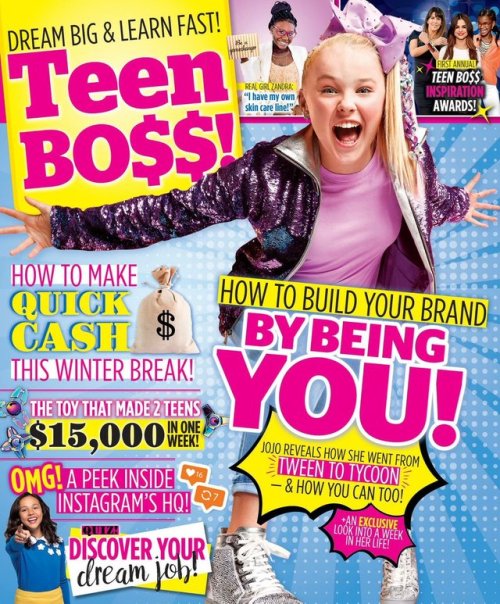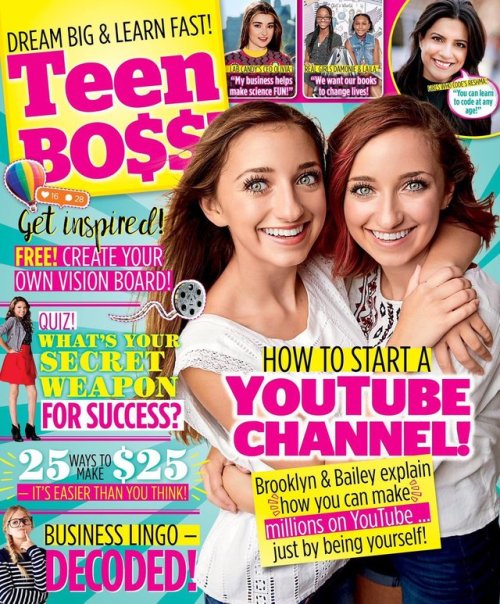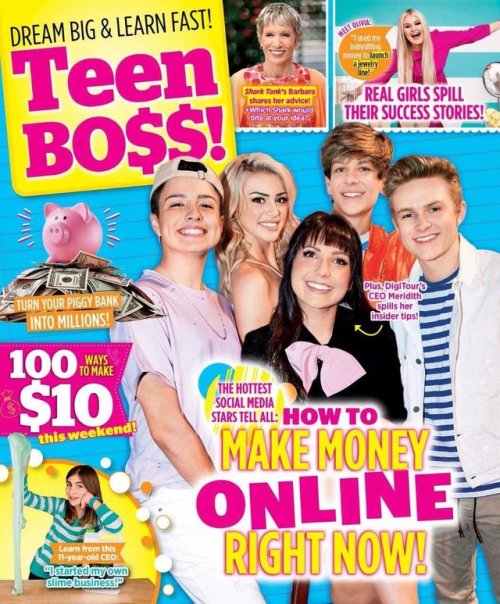stcrimson667:yayfeminism:stcrimson667:yayfeminism:This is a real magazine. “Tween to tycoon”..“When
stcrimson667:yayfeminism:stcrimson667:yayfeminism:This is a real magazine. “Tween to tycoon”..“When I was growing up, it seemed like everyone wanted to be a teacher, or a veterinarian,” said [editorial director] Galla. “Now, I heard ‘app creator,’ ‘chef on YouTube’ or ‘CEO.’ These girls want to establish a brand — or make themselves into a brand — with their social media channels, and I was just blown away by their ideas.”People, I think, don’t really understand the reality this is reflecting. I’m 26 years old, I graduated from university about 2-3 years ago and I still don’t have a job, I’ve been looking for years and nothing. There are no real jobs anymore, the best my generation can hope for is working in retail for minimum wage for the rest of our lives. My generation doesn’t have any upward mobility anymore, we don’t imagine the future and think “One day, I’ll have a good job in a company, with a corner office and everything!”, we think “One day, I’ll work my way up to manager and then I’ll run this KFC franchise for its owner!”. And, really, the best job that’s out there for my generation is on Youtube, making Youtube videos. We have pretty much no other pretty jobs because no one cares to try and give us any better jobs, the focus is entirely on Baby Boomers and Gen Xs and, between both of them, no one cares about us, no one wants to give us jobs when they could give it to someone who has 10x more experience that we do. My generation has nothing, but minimum wage and exploitation, or Youtube. That’s pretty much it. Honestly, I wish I had had this advice when I was a teenager, maybe I would actually be somewhere now instead of beginning to leave my twenties behind and still having nothing!This, plus automation is destroying a lot of old jobs and will continue to eliminate more.One thing that goes unaddressed when talking about successful Youtubers is that many come from wealthy or privileged backgrounds. It’s easier to spend time on something like Youtube when you don’t need to work a minimum wage job to pay rent. Teenagers see the success stories and think there’s a good chance they can do it too, and this magazine is exploiting that. I think that that’s actually very, very true, especially with the larger, more successful Youtubers, and something I didn’t think about before (and please forgive my harsh tone earlier). And smaller Youtubers who don’t have job outside of Youtube are pretty much 100% supported on Patreon, by their audiences directly.And I think that there’s also more to the current job and employment worlds than a lack of good job, too, now that I think about it. The one job I want more than anything in the entire world, is to be a published author (I’m currently seeking an agent for my book, Shadow Culture. If anyone is interested, please message me, I will write the contract in my own blood if I have to!!!), and, through my adventures in querying agencies and publishers, one thing that’s often come up is what my social media presence is like. How active am I on Twitter? How active am I on Facebook? Where has my work been published before? How much have I sold previously? (The answer to the later two is none, which is probably why I’m still looking for an agent) I’ve even had some job applications which ask about my social media presence. Social media following is becoming a draw for people in the entertainment and the art industries, especially. Essentially, we’re being asked to turn ourselves into a brand and sell ourselves. In the literary world, it’s all for the advertisement of your book, social media is the primary way that books are sold nowaday. It’s the commodification of identity, I’ve seen this in my query letters and I’ve seen this in my resumes. It’s packaging up ourselves and who we are and selling them to businesses and corporations for them to make money off of us and, if you don’t have a reasonable presence online, then often times it’s like you have no identity to these companies. And really this all comes down, I feel, to companies and business becoming increasingly insular and risk-averse. In the aftermath of the ebook crisis, the literary industry could have opened itself up and started looking at books and projects that they wouldn’t have normally given a chance to, but, instead, they circled the wagons and only take projects that they absolutely 100% know that they will be able to make money off of. I see the same thing in business, especially around the issue of millennials trying to find work. We don’t have as much experience as others which therefore means we’re a risk, the investment a company makes in us may not buy off even though statistics show that actually the more investment made in workers, the more pay-off there is for the company, and so they go for older workers, workers who they feel have proven that they are worth the investment, that they have proven that they will get their money back from these proven workers. This also plays in with privilege, as well, where people outside of the typical white, straight, cis-gender, allustic, able-bodied etc. identities are seen as risks that companies and business often don’t want to take.I’ve seen some push back on the literary front, under the #OwnVoices movement, but even this I’ve found incredibly flawed. Basically, it was an attempt to try to get more POC, LGBT, autistic, non-male, non-cis gender, etc. people into the industry, but the industry is really only interested in these people when they’re basically writing auto-biographies about themselves, when they’re packaging up their identities to be sold to the masses. Because marginalized identities are selling very, very well right now.This push towards a focus on social media and Youtube is really corporate pressure for people to sell themselves, to package themselves up to be inspected by industry and business, for mass-consumption and for financial exploitation. So, yeah, on the one hand, Youtube is really the only stable career for people of my generation anymore, but it’s also a means for those in industries who sells identities and narratives to have a ready supply of identities for consumption. -- source link
Tumblr Blog : yayfeminism.com


